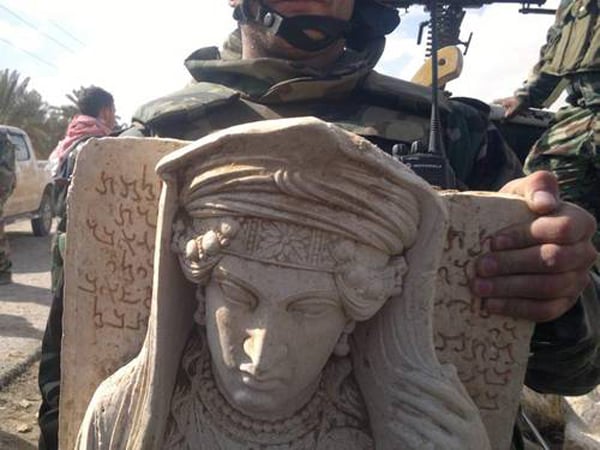Art World
UN Bans Export of Antiquities to Target Islamic State Revenue
The resolution is a milestone for the protection of Syrian cultural heritage.

The resolution is a milestone for the protection of Syrian cultural heritage.

Hili Perlson

UNESCO has published the United Nations Security Council Resolution 2199 that condemns the destruction of cultural heritage and adopts legal measures to counter illicit trafficking of antiquities from Iraq and Syria. The resolution decidedly targets Islamic State revenues, and threatens to place economic and diplomatic sanctions against countries and individuals that enable terrorist groups to profit from trade in antiquities, oil, and hostages.
The Director-General of UNESCO, Ms Irina Bokova, welcomed the new resolution, calling its adoption “a milestone for enhanced protection of cultural heritage in Iraq and Syria.” The measures stipulated in the document extend to Syria “the prohibition of trade of cultural objects already in place for Iraq since 2003,” she added.
Notably, the ban retroactively prohibits any international trade in Syrian antiquities that have been exported since March 15, 2011. It also reaffirms its existing prohibition of any international trade in Iraqi antiquities that have been exported since August 6, 1990.
The Hazardous Implications of Wartime Trade
The Director-General stressed that the UN Security Council acknowledges and recognizes the hazardous implications of wartime trade of cultural artifacts as a source of funds for terrorist organizations. She notes, “It is also a clear recognition that the pillage, destruction, and trafficking of cultural heritage are more than a cultural tragedy—this is also a security and political imperative to be taken into account in all peace efforts.”
In its preamble, the resolution reiterates that “oilfields and their related infrastructure […] alongside extortion, private foreign donations, kidnap ransoms and stolen money from the territory they control” all generate revenue for armed Jihadists in Syria and Iraq.
Looting and smuggling of cultural heritage items from archaeological sites, museums, libraries, archives, and other sites has long been used to finance terrorist organizations’ recruitment efforts and strengthen their operational capability to organize and carry out terrorist attacks.

ISIS militants are shown smashing priceless sculptures on video
Photo: im41.com
The resolution’s text, which was drafted by Russia, requires governments to ensure that they aren’t engaged in direct or indirect trade with Islamic State and al-Qaeda-affiliated groups such as the al-Nusra Front in Syria.
A Rare Display of Unity
Bloomberg reports that the U.S. and its European allies co-sponsored the draft in a rare display of unity, in contrast to their deadlock over Syria’s civil war and the conflict in Ukraine. The resolution will presumably hold accountable countries such as Turkey and Syria that allow the purchase of oil from the militant group al-Nusra. It would require the Security Council to debate whether any violations have occurred and what punitive measures it would order.
The document also reaffirmed previous resolutions discouraging the paying of ransom without spelling out new consequences for yielding to the demands of kidnappers.
“We took yet another important step in suppressing the funding of terrorists, first and foremost as a result of the illegal trafficking of oil, and also to suppress the terrorist threat which Syria, Iraq and other states in the Middle East are coming up against, and whose impact is felt far beyond the limits of the region,” Russia’s Ambassador to the UN Vitaly Churkin told the Security Council after the resolution’s adoption.
The website Conflict Antiquities published an analysis of the resolution, and weighed in on the Security Council’s acknowledgment of destruction by non-Jihadi groups as well. It quotes Article 15 which “Condemns the destruction of cultural heritage in Iraq and Syria particularly by ISIL and ANF, whether such destruction is incidental or deliberate, including targeted destruction of religious sites and objects” (see ISIS Militants Demolish Jonah’s Tomb in Iraq, and Al-Qaeda Militants Destroy Sufi Shrine in Yemen).
Islamic State’s potential revenue from crude is as high as $1.65 million a day, a November UN report estimates. Over 12 months, the group was able to raise as much as $45 million from kidnapping for ransom, the UN said in the report. The newly adopted resolution says the group encourages looting historical and archaeological sites and profits from taxing the looters, adding that it was difficult to estimate how much revenue that generates.